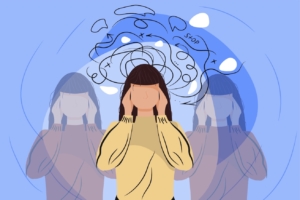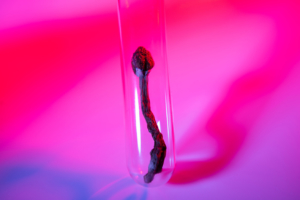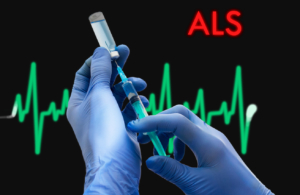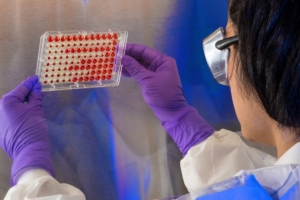
If you are one of the millions of people with PTSD or depression who watched Michael Pollan’s How to Change Your Mind on Netflix, you may be looking to find psychedelic clinical trials where you can access the wonders of psychedelic therapy. In the docuseries, Pollan is not shy about promoting stories of people who claim to have been miraculously healed or cured by psychedelic therapy, and these stories provide a ray of hope for many people suffering from chronic mental health conditions. But there’s a problem —access to psychedelic therapy does not exist yet, and it may not exist for many years.
Following the release of How to Change Your Mind, researchers around the world were inundated with requests from people looking to enroll in psychedelic clinical trials. Eduardo Schenberg, a researcher with the Brazilian Instituto Phaneros, tweeted about some of the responses he has received.
Ripples of the @netflix/@michaelpollan tsunami on Brazilian shores.
- Dozens of patient emails daily:
- Desperation for new treatments;
- Frustration because Tx are not yet available;
- Huge confusion between psychedelic-assisted therapy and microdosing/stand-alone drugs.
—Eduardo Schenberg
Ripples of the @netflix/@michaelpollan 🇺🇲 tsunami on Brazilian 🇧🇷 shores.
Dozens of patient emails daily:
• Desperation for new treatments;
• Frustration because Tx are not yet available;
• Huge confusion between psychedelic-assisted therapy and microdosing/stand-alone drugs;— Eduardo Schenberg, PhD (@ee_schenberg) July 19, 2022
This tweet mirrors the sentiments of many psychedelic researchers who receive daily requests from people looking to enroll in psychedelic studies. Even here at Psychedelic Spotlight, we receive weekly emails and web comments from people with chronic conditions looking to enroll in psychedelic clinical trials. Here are examples of typical requests for information:
I have bipolar 2 and borderline personality disorder. I was diagnosed in South Africa after a suicide attempt in Zimbabwe where I was born and grew up in the Rhodesian war. I was 29 years old. I recently moved to Newcastle-upon-Tyne in Dec 2019. I watched the series How To Change Your Mind where I heard about the methods and your clinic
Firstly can you help me get off my chronic medication. I am on the following:
Sodium valporate 500mg morning and evening, Quetapine 200mg, Propanadol 40mg, Venlafaxine 150mg (psychiatrist took me off this as I was going into hypo mania), Trisequens.
From 2017 I have experienced half the year hypo manic and then half the year suicidally depressed. I have overdosed 5 times and each time landed up on ICU 99% of the time I have to be resuscitated. So my faith in chronic medication is zero. However the psychiatrist and psychologists won’t support my desire to wean off chronic medication.
Please let me know if you can help me and what is the cost.
Carolyn
Also:
I have lived with depression and anxiety for 40 years. I have had many diagnoses and psychiatric interventions over the years. I regularly have intrusive images, which are too distressing to describe, and are worse when my mental health is particularly poor.
I have attempted to take my life many times and regularly consider suicide. I often struggle to find joy and purpose in life. Like Carolyn, I watched How To Change Your Mind and was moved to tears several times. I felt that maybe there is some hope and would like to know if there are any clinics in Newcastle that offer psychedelic assisted treatment.
The medication I am currently prescribed makes me feel numbed and dislocated. I want to experience life more fully and appreciate my existence.
These people are desperate for solutions and are willing to try anything, but the reality is that psychedelic clinical trials are already overwhelmed with applications, and the rigorous screening process means that 95% of them will not meet the criteria for enrollment. This reality leaves people despondent, and many of them will instead look for underground therapists or unlicensed guides willing to treat them illegally. Is this really the response that Michael Pollan and Netflix wanted?
The situation might not be so desperate if the promises made in How to Change Your Mind weren’t so compelling. Talking about the psychedelic drugs MDMA, LSD, psilocybin, and mescaline, Pollan and his coterie of advocates make it sound like these substances are miracle drugs for rebooting and rewiring your brain, and one or two treatments in a nicely appointed clinic can treat even the worst chronic conditions. But none of these substances are approved for clinical use, and if people go searching for psychedelic therapy, the only available option is visiting a ketamine clinic. Although ketamine has shown promise for treating extreme depression and suicidality, many patients do not respond well to the treatment, and the effects tend to wear off after a few weeks and the treatments need to be repeated on a regular basis. This is not the miracle cure promised by the docuseries —it is more like a classic bait and switch.
While some states like Oregon and Colorado are moving to decriminalize psychedelic drugs for therapy, a letter from the the Department of Health and Human Services indicates that it expects it will be at least two years before these treatments are approved by the FDA. On top of this, Michael Pollan himself recently admitted that there is a potential need for as many as 100,000 new psychedelic facilitators to meet the growing demand for this therapy. MAPS founder Rick Doblin has recently said that, “MAPS’ goal is to train 25,000 therapists in MDMA-assisted therapy for PTSD before 2030.” This is an extremely lofty goal considering that the MAPS MDMA for PTSD training program has not yet been demonstrated to be clinically effective, nor does anyone know exactly how MAPS came up with the methods used in their therapy, which is described as, “A theoretical approach based on a philosophy that every person has within them an intrinsic wisdom and ability to heal, and that this inner healing wisdom blossoms naturally in an environment of safety and support.” In other words, the protocol depends on a strong placebo effect, or some mysterious healing force similar to magic.
To be clear, the MAPS therapist training program is not founded in any kind of clinical evidence. A recent tweet from Alaina Jaster, a PhD candidate investigating psychedelics and addiction highlights this clinical disconnect:
Anyone have any citations on why the current MAPS model of psychedelic-assisted psychotherapy is used? Evidence-based practices of this model? Has it been proven to be the best model compared with other models or modalities?
Please share those evidence-based articles!
— Alaina Jaster (@JasterAlaina) August 3, 2022
Anyone have any citations on why the current MAPS model of psychedelic-assisted psychotherapy is used? Evidence-based practices of this model? Has it been proven to be the best model compared with other models or modalities?
Please share those evidence-based articles!
—Alaina Jaster
Of course those evidence-based articles affirming the MAPS model do not exist. And even though there are dozens of different groups offering psychedelic guide and therapist training programs, none of these programs have actually been shown to be effective, and none of them have been approved or vetted by any form of governing body. And this is going to be a problem down the road for every form of psychedelic therapy, even those approved by voters in states like Oregon. This may come as a surprise to some, but earlier this year the Oregon Higher Education Coordinating Commission (HECC) sent out a memo to the Oregon Psilocybin Services group reminding everyone that psilocybin facilitator training programs will be required to be licensed by the state. Considering that the Oregon facilitator training program does not even exist, and the HECC approval process for new professional training programs can take many years to complete, the idea that there will be thousands of psychedelic therapists trained in clinically proven state authorized programs within the next few years seems unlikely.
So now, thanks to Michael Pollan and How to Change Your Mind, we have a growing demand for a therapy that is not approved, has not been demonstrated to be effective, with no actual authorized training programs for the thousands of therapists needed to meet the growing demand. This could be described as a bottleneck, but it is potentially much worse than that, it is shaping up to be a train wreck. There have already been a handful of psychedelic clinical trial participants who have spoken out about therapist power imbalances and flaws in protocol design that have led to sexual abuse and the denial of negative outcomes in trial results. Considering that these clinical trials are now attracting desperate and vulnerable people with promises of miracle cures, there are ultimately going to be many people who are left angry and disillusioned, potentially scarred and abused, from their exposure to psychedelic therapy. We did not see any of those stories highlighted in the Netflix series, but their outcomes are just as real and predictable as the outcomes of people who claim to be miraculously healed.
Given the swarm of media attention and the buzz of hype swirling around the psychedelic space, the onus is now on the researchers running these clinical trials to produce the amazing results promised by the advocates in How to Change Your Mind. Every clinical trial subject and prospective patient is going to be influenced by Michael Pollan, and is going to enter into treatment expecting spectacular results. To quote a paper published earlier this year, entitled Great Expectations: Recommendations for improving the methodological rigor of psychedelic clinical trials:
High-dose psychedelic trials may also be particularly susceptible to a type of bias termed “hype” or the “Michael Pollan Effect.” Some have argued that psychedelic therapy marks the most important innovation in psychiatry since the introduction of SSRIs, or possibly ever, and it is not uncommon to hear claims about the potential for psychedelics to “change the world” from industry leaders and enthusiasts. This pervasive messaging may lead to amplified positive expectations compared with many other types of clinical interventions and perhaps motivates participants to “not let the movement down” by failing to clinically improve.
This effect was noticed well before the Netflix docuseries, beginning in 2018 after the publication of the book How to Change Your Mind. Tehseen Noorani, a researcher studying psilocybin and addiction, noted this increase in patient expectations in a 2020 article entitled The Pollan Effect: Psychedelic Research between World and Word. Noorani laments, “Many psychedelic clinical researchers are concerned that the efficacy of psychedelic treatments may be compromised if they are understood to work as ‘magic bullets.’” Noorani notes that because of Pollan, many researchers have been forced to lower patient expectations before each trial to prepare them for more realistic outcomes.
While some may claim that these heightened expectations could be beneficial for the patient mindset or could enhance whatever placebo activity is responsible for recovery, it is difficult to imagine that everyone’s experience is going to live up to this hype. And in the face of such overwhelming promise, patients who do not respond well to psychedelic therapy can feel shame and blame themselves for not being ready to properly “accept the treatment.” And we have already seen this happen —when psychedelics produce negative experiences the community is always quick to blame the user and show little or no sympathy for bad outcomes, even attempting to describe bad trips as “challenging experiences” that people can still learn from. Many people who enter psychedelic therapy after years of high hopes are going to be left disillusioned and abandoned by the same advocates who claim that their primary goal is to help people. The writing is on the wall.





